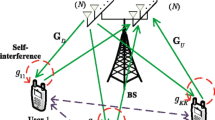Abstract
In wireless communications systems with time-division duplex (TDD) deployment, channel reciprocity and symmetric interference between transmitter and receiver sides are two widely-adopted assumptions for the design of optimal adaptation transmission mode. However, in practice, there is an undesirable but non-negligible effect, namely the asymmetric interference, that makes the assumptions no longer valid. In this paper, a simple closed-loop feedback method of compensating interference asymmetry in TDD multiple-input multiple-output (MIMO) orthogonal frequency division multiplexing (OFDM) system is proposed. The system makes the estimated interference at transmit-side be able to track the instantaneous receive-side interference dynamically. The proposed method maintains constant frame error rate (FER) by adopting adaptive modulation coding (AMC) and power loading. The final simulations have verified the effectiveness of the new method.
Similar content being viewed by others
References
Caire G, Shamai S. On the capacity of some channels with channel state information [J]. IEEE Transactions on Information Theory, 1999, 45(6): 2007–2019.
IEEE C802.16e-04/103r1, Signaling methodologies to support closed-loop transmit processing in TDDOFDMA [S].
Lau V K N, Liu Y, Chen T A. On the design of MIMO block-fading channels with feedback-link capacity constraint [J]. IEEE Transactions on Communications, 2004, 52(1): 62–70.
Love D J, Heath R W J, Strohmer T. Grassmannian beamforming for multiple-input multiple-output wireless systems [J]. IEEE Transactions on Information Theory, 2003, 49(10): 2735–2747.
Love D J, Health R W J. Limited feedback precoding for spatial multiplexing systems using linear receivers [C]//Proceedings of 2003 IEEE Military Communications Conference. Boston, USA: IEEE, 2003: 627–632.
Povey G J R. Capacity of a cellular time division duplex CDMA system [J]. IEE Proceedings-Communications, 2004, 141(5): 351–356.
Tolli A, Codreanu M. Compensation of interference non-reciprocity in adaptive TDD MIMO-OFDM systems [C]//Proceedings of IEEE 15th International symposium on Personal, Indoor and Mobile Radio Communications. Barcelona, Spain: IEEE, 2004: 859–863.
Tolli A, Codreanu M, Juntti M. Suppression of non-reciprocal interference in adaptive MIMO-OFDM cellular systems [C]//Proceedings of IEEE Vehicular Technology Conference. Stockholm, Sweden: IEEE, 2005: 1072–1076.
Sampath H, Talwar S, Tellado J, et al. A fourth-generation MIMO-OFDM broadband wireless system: Design, performance, and field trial results [J]. IEEE Communication Magazine, 2002, 40(9): 143–149.
Stuber G L, Barry J R, Li Y G, et al. Broadband MIMO-OFDM wireless communication [J]. Proc IEEE, 2004, 92(2): 271–294.
Paulraj A J, Gore D A, Nabar R U, et al. An overview of MIMO communications: A key to gigabit wireless [J]. Proc IEEE, 2004, 92(2): 198–218.
Foschini G J, Gans M J. On limits of wireless communications in a fading environment when using multiple antennas [J]. Wireless Personal Communications, 1998, 6(3): 311–335.
Telatar E. Capacity of multi-antenna Gaussian channels [J]. European Transactions on Telecommunications, 1999, 10(6): 585–595.
Goldsmith A, Jafar S, Jindal N, et al. Capacity limits of MIMO channels [J]. IEEE Journal on Selected Areas in Communications, 2003, 21(5): 684–702.
Boelcskei H, Gesbert D, Paulraj A J. On the capacity of OFDM-based spatial multiplexing systems [J]. IEEE Transactions on Communications, 2002, 50(2): 225–234.
Raleigh G G, Cioffi J M. Spatio-temporal coding for wireless communication [J]. IEEE Transactions on Communications, 1998, 46(3): 357–366.
Sampath H, Stoica P, Paulraj A. Generalized linear precoder and decoder design for MIMO channels using the weighted MMSE criterion [J]. IEEE Transactions on Communications, 2001, 49(12): 2198–2206.
Scaglione P, Stoica P, Barbarossa S, et al. Optimal designs for space-time linear precoders and decoders [J]. IEEE Transactions on Signal Processing, 2002, 50(5): 1051–1064.
Wong K K, Lai S K, Cheng R S K, et al. Adaptive spatial-subcarrier trellis coded MQAM and power optimization for OFDM transmissions [C]//Proceedings of IEEE 51st Vehicular Technology Conference. Tokyo, Japan: IEEE, 2000: 2049–2053.
Wong K K, Cheng R S K, Letaief K B, et al. Adaptive antennas at the mobile and base stations in an OFDM/TDMA system [J]. IEEE Transactions on Communications, 2001, 49(1): 195–206.
Codreanu M, Tujkovic D, Latva-Aho M. Adaptive MIMO-OFDM with low signaling overhead for unbalanced antenna systems [C]//Proceedings of IEEE 15th International symposium on Personal, Indoor and Mobile Radio Communications. Barcelona, Spain: IEEE, 2004: 2382–2386.
Codreanu M, Tujkovic D, Latva-Aho M. Adaptive MIMO-OFDM with low signaling overhead for unbalanced antenna systems [J]. IEICE Transactions on Communications, 2005, E88-B(1): 28–38.
Larsson E G, Stoica P. Space-time block coding for wireless communications [M]. England: Cambridge University Press, 2003.
Author information
Authors and Affiliations
Corresponding author
Additional information
Foundation item: the National Natural Science Foundation of China (No. 60572130), the Open Research Fund of National Mobile Communications Research Laboratory, Southeast University, the Research Fund of Qing-Lan Engineering, Jiangsu Province, the Key Project of Natural Science Research Program of Universities, Jiangsu Province (No. 08KJD510001), the Doctorial Fundation of Ministry of Education, and the National Basic Research Program (973) of China (No. 2007CB310607)
Rights and permissions
About this article
Cite this article
Song, Rf., Zeng, Dy. Simple closed-loop method to compensate interference asymmetry in time-division duplex MIMO-OFDM systems. J. Shanghai Jiaotong Univ. (Sci.) 14, 503–509 (2009). https://doi.org/10.1007/s12204-009-0503-7
Received:
Published:
Issue Date:
DOI: https://doi.org/10.1007/s12204-009-0503-7
Key words
- time-division duplex (TDD)
- multiple-input multiple-output (MIMO)
- orthogonal frequency division multiplexing (OFDM)
- adaptive modulation coding (AMC)
- adaptive closed-loop feedback




